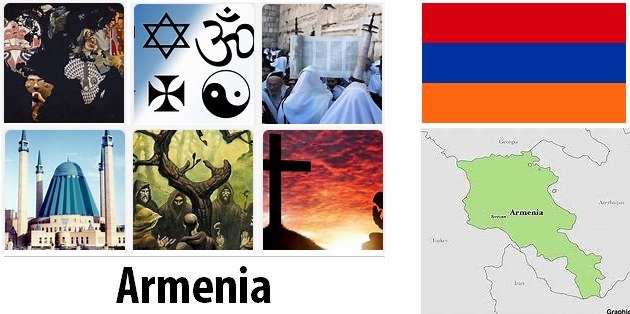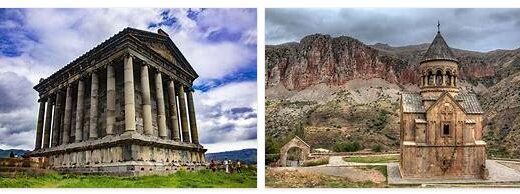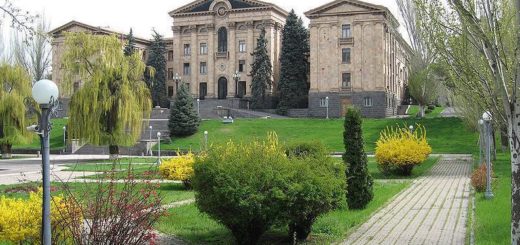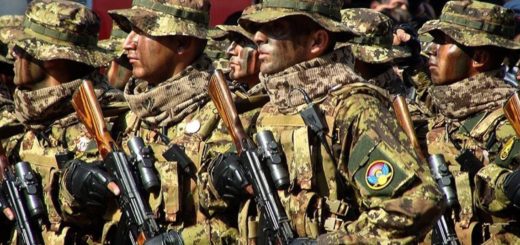Armenia Religion
Armenia claims to be the first country in the world in 301 to have adopted Christianity as a state religion. The Armenian Apostolic Church is the oldest national church in the world.
It broke with the Byzantine church in the 500s when it rejected the two essences of Christ – a divine and an earthly one – and instead oriented itself to the churches of Egypt, Syria and Ethiopia.
These churches are “monophysical”, that is, they believe that the spiritual and human nature of Christ is a unity. The church language of the Armenian Apostolic Church is ancient Armenian, which has not changed significantly since the 400s. The church’s highest leader is called Catholic and has its seat in the city of Edjmiatsin west of Yerevan.
Historically, the Armenian Apostolic Church has been a unifying force, both within the country and for Armenians in exile. Of its 40 pins, 30 are located outside Armenia. The church played an important role in the struggle for liberation from the Soviet Union, but 70 years of Soviet communism, of course, thwarted Armenia’s Christian heritage. The church also sees a strong divide between those who want to connect to the western world and those who want to approach Eastern Europe’s Russian and Serbian Orthodox churches.
The church is officially separated from the state, but the constitution gives the Armenian apostolic church a position as a national religious community. Other churches and communities must register with the authorities to publish newspapers, broadcast radio or television programs or rent premises. As far as is known, no religious communities have been denied registration. Formally, missionary activities are not allowed, not even for the Armenian Church, but in practice the state does not appear to interfere in the activities of any community.
- Countryaah: Population statistics for 2020 and next 30 years in Armenia, covering demographics, population graphs, and official data for growth rates, population density, and death rates.
Among the religious minorities are Russian Orthodox Christians and Muslims. There is also a small group of residents who profess Yazidism, an ancient Kurdish religion that, over the millennia, has drawn features from other religions such as Zoroastrianism, Judaism, Christianity and Islam. In recent years, when the Yazidis suffered severe persecution during the Islamic State (IS) ravages in Iraq, they have found a refuge in Armenia. A new Yazidic temple has been erected in a village outside Yerevan. The shrine has been partially funded by a Yazidian businessman, who was born nearby but active in Moscow.
A religious minority that has sometimes complained of discrimination is Jehovah’s Witnesses, who are usually imprisoned for their refusal to do military service.
2018
December
Landslide victory for reform alliance
December 9
Nikol Pashinyan gets popular term as prime minister, even though not half of the electorate votes in the new election. His Alliance My Step receives over 70 percent support, according to the election authority. This means that Pashinyan will have a satisfactory majority in Parliament to push through his political program, including promised efforts against corruption. Over the five percent barrier reaches A successful Armenia, led by businessman Gagik Tsarukyan, with 8 percent and Illuminated Armenia with 6 percent, but the electoral system gives the opposition parties at least 30 percent of the mandate. The old Republican power party can’t handle the lockout.
November
New elections in December
November 1st
Parliament is dissolved and new elections have been announced until 9 December. This is the result of the failure of the members for the second time to elect a new prime minister. For Nikol Pashinyan, who became prime minister in May after leading a popular protest wave, the new election is a desirable position. Parliament may now have a very changed composition, so that it will be dominated by the political groups that have supported the wave of protests and Pashinian’s reform plans.
October
One step closer to new election: Pashinyan not selected
October 24th
Nikol Pashinyan will not be elected prime minister at a special session of parliament. It is completely in line with his plans. Now he aims not to be elected when a new vote is held on October 31 – and in that situation the law says it will be new election.
Pashinyan departs in complicated play
October 16
Prime Minister Nikol Pashinyan resigns, he announces via TV. The departure is perceived as a way of forcing a new election. Pashinyan and his reform movement would have good chances to win, allowing him to return as head of government with stronger support in Parliament. For his part, his opponents in the current parliament could prevent re-election by appointing a new prime minister. In front of supporters, Pashinyan says his plan is to stand as a candidate in parliamentary votes – and lose. Then new elections must be announced.
Ministers get fired
October 3
Prime Minister Nikol Pashinyan gives six ministers fired, among them the heads of the transport and finance ministries. The six who are allowed to go belong to the parties Dashnak and A successful Armenia. They have previously supported Pashninian’s demand for reform, but now, like the old power elite of the Republican Party, voted for a law that could prevent it from being elected. Following the great success of the reformers in the local elections in the capital in September, Pashinyan wants to enforce a new election so that he and his supporters also gain a majority in parliament.
New team slows down Pashinyan’s plans
October 2
Parliament is voting for a law that makes it more difficult to dissolve Parliament and announce new elections. This is in conflict with the new Prime Minister Nikol Pashinyan’s plans and causes his supporters to again take to the streets in protest. Pashinyan says before the crowd that the Republican Party of Power has staged a counter-revolution through the decision. He now threatens to step down, and that could force a new election – but only if the parliament, which is still dominated by the Republican Party, twice fails to elect a new prime minister.
Aznavour, Armenian people hero, dies
October 1st
French Armenian singer and actor Charles Aznavour dies at the age of 94. Aznavour, born as Chahnour Varinag Aznavourian in Paris with parents of Armenian descent, had one of the world’s most long-standing artist careers with appearances up to a very high age. In 1988, when an earthquake claimed about 25,000 lives in Armenia, he formed the Aznavour organization for Armenia. The proceeds from a record recording along with many other artists then went to the relief work. In 2004 Aznavour was named “the hero of the Armenian people”. Ten years before his death, he also became an Armenian citizen by decree of the President.
September
Flight exercise in contested enclave
September 25
In the Armenian-backed Republic of Nagorno-Karabakh, a flight exercise is being launched which surrounds Azerbaijan as an aggression. This is happening at the same time as talks are being planned between the countries’ foreign ministers at the UN General Assembly in New York. In the latest gunfire across the border, a week before the exercise, two soldiers must have been killed according to what the Armenian side states.
Election in Yerevan success for new rulers
September 23
Local elections are held in the capital Yerevan, where almost half of Armenia’s population lives. Mayor Taron Margaryan resigned on corruption charges on July 9 and the city’s elected officials have been unable to agree on a successor. The election is also the first since the country’s last government was forced to resign. Prime Minister Nikol Pashinyan says the result in the local elections is important for him to know if he has enough popular support to negotiate a new election. He is richly rewarded: Pashinian’s Alliance My step gets over 80 percent of the vote. It opens for his ally Hayk Marutyan, 41-year-old with background as an actor, to become a new mayor. My step promises anti-corruption, but Parliament is still dominated by the old Republican power party.
July
Warning finger is raised in Moscow
31 July
Russia’s foreign minister warns Armenia’s new leadership of political action against the old – Moscow-friendly – elite. Several leading people out “the old guard” have been the subject of action since Prime Minister Pashinyan launched a anti-corruption program.
The president is being prosecuted for election fraud
July 27
Former President Robert Kotjaryan will face trial accused of electoral fraud. According to the prosecution, he manipulated the 2008 election in favor of his successor Serzh Sargsyan. At that time, protests against the election result were turned down with violence.
May
New police chiefs and new ministers
May 10
The national police chief and the head of the Armenian security service are replaced, Nikol Pashinyan announces. The new prime minister must also form a new government; it must have happened no later than two weeks after his entry.
Pashinyan becomes prime minister
May 8
Parliament elects Nikol Pashinyan as prime minister with 59 votes to 42, after the Republican Party decided not to block the election. As opposition leader, Pashinyan has pledged measures against poverty and corruption and, in addition, to deal with oligarchs who have influence over politics. He has a popular protest movement behind him, but pending reform is still a challenge: Republicans have a majority, 58 of the 105 seats, in Parliament.
Profitless choice, big strike announced
May 1
Opposition leader Nikol Pashinyan does not receive enough support in parliament to be elected prime minister. 53 year votes are required, but only 45 of the 105 members vote for him. The Republican Party has thus, without nominating its own candidate, succeeded in preventing him from becoming head of government. Before the vote, Pashinyan has traveled around the country to garner popular support and is now announcing a major strike. According to the constitution, a new vote must be held within one week. If no one is elected then Parliament must be dissolved.
April
New leader election announced
26th of April
Decides that a vote on the post of Prime Minister should be held on 1 May; Opposition leader Nikol Pashinyan says he sees himself as a given candidate and that there will be no settlement behind closed doors between the opposition and the Republican Party. Pashinyan is nominated by an opposition bloc, but it is uncertain if he can get the support of enough members to be elected. Assessors expect that there will also be a new election to Parliament later.
Prime Minister Serzh Sargsyan resigns
April 23
After a week of extensive demonstrations against the appointment of Sergzj Sargsyan as new head of government, he announces his departure. The message is left shortly after the protesters leader Nikol Pashinyan was released after being arrested two days earlier. First Deputy Prime Minister Karen Karapetyan becomes new newly appointed head of government.
Police seize protest leader
April 22
New President Armen Sargsyan has offered to mediate but has been rejected by the opposition. On the tenth day of mass protests, Prime Minister Serzh Sargsyan comes to a meeting with protesters leader Nikol Pashinyan in Yerevan, but he quickly cancels the meeting. A few hours later, the protest leader is arrested by police. Pashinyan is also a member of parliament, giving him freedom of prosecution. He cannot be detained for more than three days, unless Parliament’s members accept it. Over the past week, more than a few hundred protesters have been arrested.
Drums and vuvuzelor against the Prime Minister
April 19
For the seventh day in a row, demonstrations are being held that former President Serzh Sargsyan will now continue to govern the country from the Prime Minister’s post. At the same time as the first government meeting after the election takes place in Yerevan, Sargsyan critics around the government office gather with drums and vuvuzelas and demand his departure. Kravall police seize dozens of people, according to AFP.
Vote surrounded by protests
April 17
Parliament votes for Serzh Sargsyan’s appointment as Prime Minister with 77 votes to 17. Behind him is the Government Coalition: Republican Party and Armenian Revolutionary Federation (Dasjnak). In connection with the vote, the street protests organized by parliamentarian and journalist Nikol Pashinyan continue, urging their supporters to a “peaceful velvet revolution”. On Yerevan’s largest square, the slogan goes: “Armenia without Serj!” Protests also take place in the cities of Gjumri and Vanadzor. About 80 protesters were arrested, according to the police.
Protests against Serzh Sargsyan’s power play
April 16
Regime critics have demonstrated for days before a vote in Parliament intended to confirm former President Serzh Sargsyan’s entry as prime minister. When the protesters try to reach the parliament in Yerevan, they are prevented by police. Authorities state that 46 people, including police, are forced to seek care.
Serzh Sargsyan brings power
April 9
Armen Sargsyan takes over as president. A few days later, the Republican Party announces that his representative Serzh Sargsyan, as expected, has been nominated for the post of prime minister, with increased powers, ahead of a planned vote in Parliament a week later.
March
Armed Attack 2016 Prison
March 20
Opposition politician Zhirayr Sefilyan is sentenced to 10.5 years in prison, accused of planning the attack on a police station in July 2016, when armed regime critics took hostages and demanded the resignation of the president. Six people have previously been sentenced to a sentence of up to five and a half years. Sefilyan was in custody at the time of the attack, accused, among other things, of harboring plans for actions against the state.
New president, but power moves
March 2
Parliament has elected a successor to President Serzh Sargsyan, who leaves the post on April 9. London Ambassador Armen Sargsyan (Sarkissian) is not reported to be a relative, however, hand-picked by his representative. The term of office is extended to seven years, but at the same time the post becomes ceremonial. Real power is shifted to the Prime Minister’s post, which Serzh Sargsyan is now presumed to be clad in the future.
Stop for Turkey normalization
March 1st
President Serzh Sargsyan stops a process meant to lead to normalized diplomatic relations with Turkey. His decree is published via the President’s Office website. Negotiations began in 2009 and two key agreements have been carved out with the help of Russia, the United States and France, but the agreements have not been approved by the parliaments of Armenia and Turkey.
February
Turkish protest against genocide decision
February 22
The Dutch parliament decides, with only three votes against, that the mass murder of Armenians in the Ottoman Empire in 1915 should be recognized as genocide. Turkey responds with sharp criticism. On the Turkish side, among other things, it is claimed that there was no systematic campaign aimed at Armenians and that Armenians exaggerate the number of people killed. To date, more than 20 countries have officially joined the assessment that the Armenians were subjected to genocide.
January
Politician Peace Prize nominee
January 23
Armenian media, at home and in exile, note that Turkish Armenian politician Garo Paylan has been nominated for the Nobel Peace Prize. He represents the opposition party HDP in the Turkish parliament. It is a women’s organization that has nominated him. The organization works to ensure that events in Hemşin on the Turkish coast towards the Black Sea are recognized as genocide.




